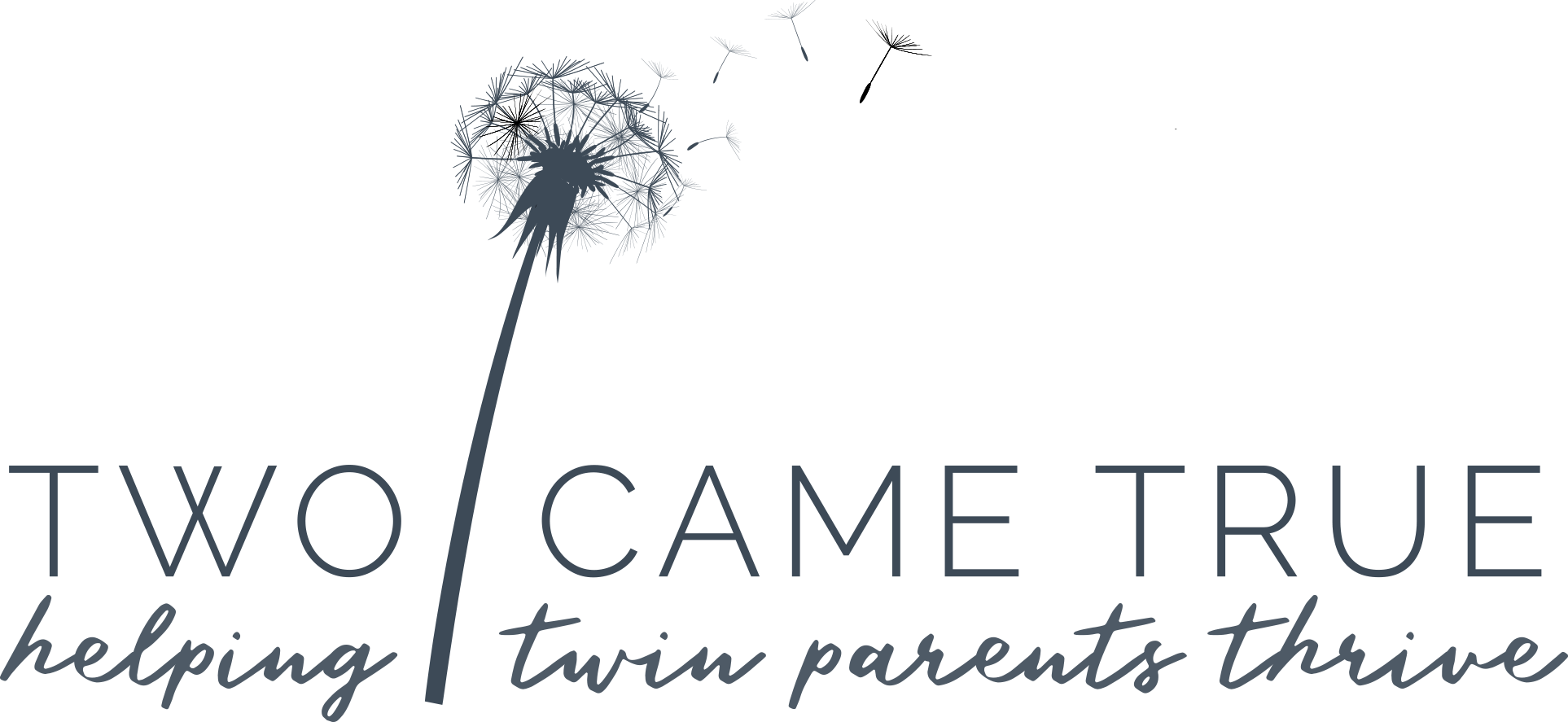Hey there tired mama!
Hopefully by now you have done the work to set the stage for SLEEP TRAINING by establishing a bedtime routine, you’ve set up the perfect environment in their nursery, and have begun to lay your babies down drowsy but awake.
If you haven’t quite done that yet, use the links above to read the other posts in this series to help you prepare for a successful SLEEP TRAINING experience!
And…if you know your twins are ready to sleep through the night without eating, you have tweaked your bedtime routine, perfected their nursery environment and worked on laying your babies down “drowsy but awake”….
Then let’s dive right in…
Here are 5 strategies that I used to successfully sleep train my twins by 11 weeks old:

Photo Credit: K. Rose Photography
YEP……I said it, 11 weeks! So to begin —
1. TRACK THEIR HABITS —
Before you can begin extending the amount of time between each nighttime feeding and getting longer stretches of sleep at night, you need to have an idea of how much your babies are eating during the day. In order for babies to be able to sleep through the entire night without a feeding, they need to be drinking 24 ounces in a 12 hour period.
So about 2 weeks before you plan to begin sleep training…write everything down!
Writing down what each baby eats at every feeding over a period of time will help you to monitor how much is going into their bodies. You might be surprised to find out that they are eating a lot less than you expected! I sure was surprised.
The same goes with daytime sleep. Babies’ daytime sleep needs vary by age, but if you follow the general rule that sleep begets sleep, you will be able to avoid overtired babies and promote longer, more restorative daytime napping. In turn, your babies will sleep better at night because they are well rested during the day.
(HINT: Grab our handy guide, “6 Secrets to Getting Your Twins to Sleep TONIGHT!” at the end of this post by joining our email list for more detailed information about your babies’ sleep needs)
Newsflash! You need to be really in tune with your babies’ sleep cues and put them down for naps when they are ready.
Be diligent!
2. LIVE AND BREATHE BY YOUR SCHEDULE —
Use your feeding increments to set a schedule as early on as possible AND stick to it! In the beginning, you feed every few hours (2-3 hour increments) and then slowly but surely, your feedings will stretch out to 3 hours and eventually move to every 4 hours.
If your babies are big enough to begin sleeping through the night, they can usually go 4 hours between feedings. (Hint: Babies that are between 12-14 pounds and are consuming 24 oz. in a 12 hour period are in the sweet spot and ready to sleep through the night!)
A sample schedule may look like this:
7 am feed
11 am feed
3 am feed
7 pm bedtime feeding
11 pm – feed
3 pm – feed
7 am wake/feed
3. KEEP YOUR INTERACTIONS MINIMAL —
During the nighttime feedings, do your best not to talk or make eye contact with your babies or turn on any light. It may feel unnatural to limit your loving interactions with your babies, but you need to become less accessible to promote better sleep.
Lastly, save diaper changes for poop only. Your babies will not get diaper rashes from wet diapers and will get used to having a nice DRY diaper every time they wake if you consistently change them throughout the night.
4. BEGIN WEANING NIGHTTIME FEEDINGS —
In order for babies to begin sleeping longer stretches at night requires you to wean nighttime feedings. Really, this means redistributing their nighttime ounces to daytime feelings.
In the schedule above, nighttime feedings happened at 11 p.m. and 3 a.m.
Begin the the early morning feeding (3 a.m.) by reducing the ounces you offer in a bottle by ½ ounce every 3 days.
Breastfeeding moms can time those feedings and reduce each nursing session by 2 minutes every 3 days. Pumping and offering a bottle is also an option for nighttime for all those breastfeeding mothers.
Repeat this until you are no longer offering this feeding and begin using this strategy for the 2nd night time feeding (originally at 11 p.m.). If your babies continue to wake after you have eliminated both feedings, give them a few minutes to try and soothe themselves back sleep.
If they struggle to resettle, go in and gently help soothe them, just enough to stop the fussing. Eventually, with your gentle support and putting them down “drowsy but awake”, your babies will be able to settle themselves back to sleep.

Photo Credit: K. Rose Photography
5. “HOLD – OFF” THE FIRST WAKING BABY —
Twin parents have an added challenge when sleep training two babies. “HOLDING OFF” the first waking baby is an IMPORTANT strategy in getting your twins to sleep through the night consistently.
Parents often wake Baby B when Baby A wakes to feed in order to help sync their schedules and feed them at the same time.
This one of the biggest mistakes I made when we initially began this process with our twins.
Sleep training is different however. Waking your babies to eat is simply teaching them to expect food in the middle of the night and will negate what you are trying to teach them…to sleep longer without eating.
When you begin, you will need to hold off the first waking baby until the 2nd baby wakes to eat. Oftentimes, your baby is waking and fussing a little because they are in the middle of a sleep cycle.
In “holding off” the first waking baby, you are resetting the schedule for nighttime feedings. Your new feed time for the next night will be the time when the second baby wakes to eat. For example, when Baby B wakes up, this might be only 15 minutes later than Baby A (who you just soothed back to sleep), feed BOTH babies. Now your NEW 11pm feeding will be 11:15 pm.
This process may be tedious and challenging the first few nights, but remember the elements of success we defined…
Get your game face on, be consistent! Suck it up now because it will quickly pay off. Usually by the 4th night you will see drastic improvements.
The rule of thumb is, DON’T REGRESS BACK to the 11 p.m. feeding the next night! Your new start time is 11:15 p.m. or later for that first feeding. The same concept can be applied to the early morning feeding as well.
Your babies are learning to sleep for longer stretches. The next night if they wake up before the new feeding time, soothe them just enough to stop the fussing or crying and allow them to fall back to sleep.
So remember…
When your babies are ready to sleep longer stretches at night without eating, you need to teach them how to do it. Your consistency and determination will get you and your babies better, more restful sleep!
And be sure that they are getting enough milk during the day, 24 ounces in a 12 hour period. You aren’t reducing their milk intake, just redistributing it.
Once you successfully make it through this process, you should expect some regression as it is natural while your babies develop. Great news however…you will be able to troubleshoot as needed because you have taught them healthy sleep habits.
I’d love to hear about your plans for SLEEP TRAINING your twins. And if you have any tips I didn’t mention, I’d love to learn from you.
Just leave a comment and let’s connect.











